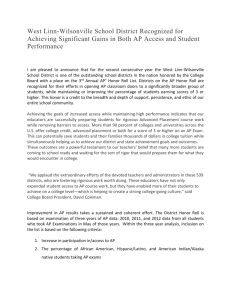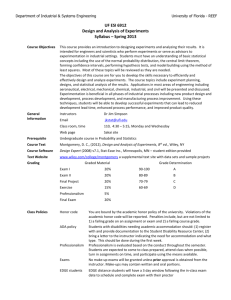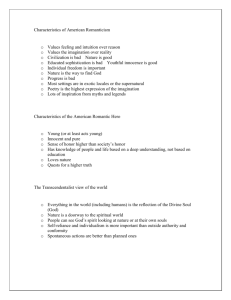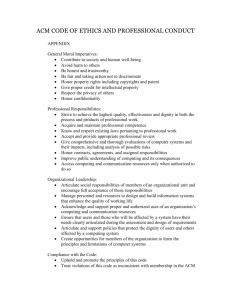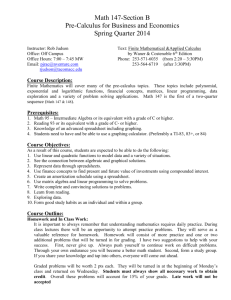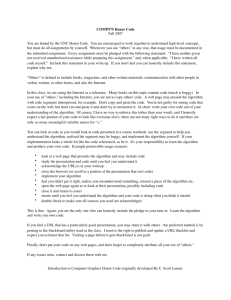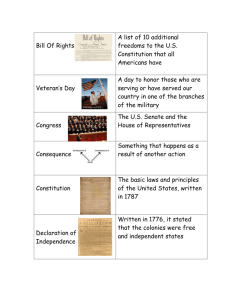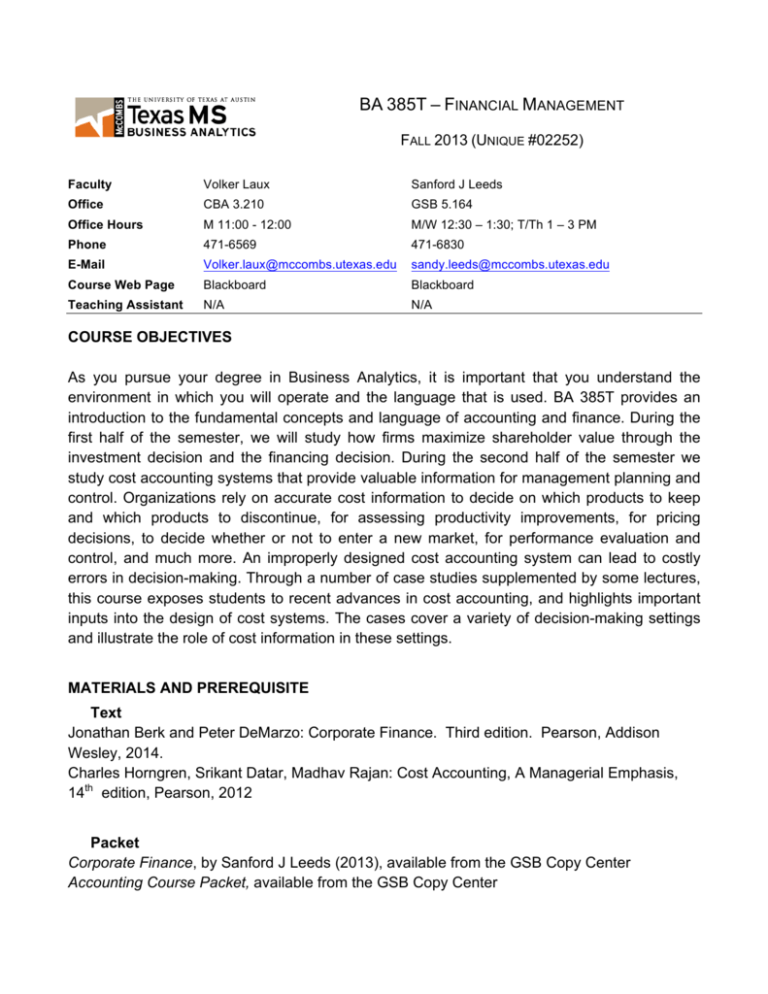
BA 385T – FINANCIAL MANAGEMENT
FALL 2013 (UNIQUE #02252)
Faculty
Volker Laux
Sanford J Leeds
Office
CBA 3.210
GSB 5.164
Office Hours
M 11:00 - 12:00
M/W 12:30 – 1:30; T/Th 1 – 3 PM
Phone
471-6569
471-6830
E-Mail
Volker.laux@mccombs.utexas.edu
sandy.leeds@mccombs.utexas.edu
Course Web Page
Blackboard
Blackboard
Teaching Assistant
N/A
N/A
COURSE OBJECTIVES
As you pursue your degree in Business Analytics, it is important that you understand the
environment in which you will operate and the language that is used. BA 385T provides an
introduction to the fundamental concepts and language of accounting and finance. During the
first half of the semester, we will study how firms maximize shareholder value through the
investment decision and the financing decision. During the second half of the semester we
study cost accounting systems that provide valuable information for management planning and
control. Organizations rely on accurate cost information to decide on which products to keep
and which products to discontinue, for assessing productivity improvements, for pricing
decisions, to decide whether or not to enter a new market, for performance evaluation and
control, and much more. An improperly designed cost accounting system can lead to costly
errors in decision-making. Through a number of case studies supplemented by some lectures,
this course exposes students to recent advances in cost accounting, and highlights important
inputs into the design of cost systems. The cases cover a variety of decision-making settings
and illustrate the role of cost information in these settings.
MATERIALS AND PREREQUISITE
Text
Jonathan Berk and Peter DeMarzo: Corporate Finance. Third edition. Pearson, Addison
Wesley, 2014.
Charles Horngren, Srikant Datar, Madhav Rajan: Cost Accounting, A Managerial Emphasis,
14th edition, Pearson, 2012
Packet
Corporate Finance, by Sanford J Leeds (2013), available from the GSB Copy Center
Accounting Course Packet, available from the GSB Copy Center
Laux and Leeds
BA 385T Fall 2013
page 2
Calculator
You will need a business calculator for this class. The calculator should have the following
keys: IRR, n, i, PV, PMT, FV, and CF. As long as those keys are present, the calculator is
fine. Most students will use either the HP 12c or the Texas Instruments BA II Plus.
Prerequisite
This is a first semester course in the M.S. in Business Analytics program. Enrollment is limited
to students enrolled in this program.
COURSE GRADING
First Half of Semester: Finance
Midterm Exam: 40%
Project:
10%
Second Half of Semester: Accounting
Final Exam: 45%
Homework: 5%
Grades: Your final course grade will be assigned based on a ranking system (which will
average your rank in each half of the course). In addition to the grading scale
described above, individual grades can be adversely affected by acts of academic
dishonesty, poor attendance (including late arrival to class) or otherwise disrupting
the learning environment.
Finance Exam: Your midterm exam will be approximately 65% - 80% quantitative, but
you will receive more detail before the exam (and the quantitative percentage could
change). I do not release old exams. I have found that releasing old exams is
problematic because (1) it results in people studying “to the exam” rather than
studying to learn; and (2) students inevitably feel that old exams are easier than the
current exam. In addition, I do not allow students to keep their exams. This maintains
the fairness of exams, since you know that no one has seen old exams. If, for any
reason, you should come in contact with an old exam, I request that you (1) not
review it; and (2) notify me immediately.
Accounting Exam: Exams will be individually-completed closed-book exams. The exams
will consist of problems, essay questions, and short answer questions. You may bring a
non-programmable calculator to the exams.
2
Laux and Leeds
BA 385T Fall 2013
page 3
Exam Dates: The Finance exam will be administered on Friday, October 18th at 8:30
AM. This will be a three-hour exam. We will not have class on the 16th (since we are
having the exam on the 18th). The final exam will be administered on the date set by
the program office (of the M.S. in Business Analytics) and the University.
Finance Project: This project is intended to further your Corporate Finance education, to help
you to learn a bit more about investing and to help you to realize that you can continue to
educate yourself when you graduate. For your project, I want you to read and OUTLINE “The
Essays of Warren Buffett: Lessons for Corporate America” by Warren Buffett and edited by
Lawrence Cunningham.
There are two reasons that I have you do this project: (1) people love this book; and (2) there
is probably no better way to learn about the market than by reading Buffett’s letters to his
shareholders. This book consolidates key points from letters. All of his letters are available
online at www.berkshirehathaway.com.
Your paper must be in outline form and cannot be longer than ten pages plus a cover page.
Ten pages is the total (other than the cover) regardless of whether you call something an
appendix or anything else. If you want an example of an outline, look at how my packet is
written.
The goal of your outline should be to allow someone who has not read this book to fully
understand what it is about. A good outline clearly distinguishes thoughts. It is not simply
sentences with a letter in front of it. It eliminates unnecessary words and groups ideas
together.
The project is usually not a grade differentiator. The reality is that the exams will result in
grade differentiation. The project is a learning exercise and the grading scale is normally
pretty tight (usually 88- 94). With that said, every so often someone turns in something that
results in a significantly lower grade. The fact that the grade range is normally tight is not
intended to diminish the importance of this assignment. Normally, I grade your exams
(because they have the largest impact on your final grade) and I have my TA grade your
outlines. This assignment is to be done alone.
Examples of times that people receive low grades include when you have clearly not read all of
the book or when you do this in sentence form. The highest grade that you can get if you do
this in paragraph form is 80 (which means that you will be in the 70s because I don’t give
perfect scores on this assignment). If you have not read the entire book, the highest grade you
can receive is 50 (and again, that score isn’t likely). But, if you read the book and outline it and
you feel like you have made a good-faith effort, you should not worry. You will know if you fall
into one of the “troubled” categories.
The project is due at 8:30 AM on October 18. I do not accept late papers. PLEASE
SUBMIT A HARD COPY OF YOUR PAPER.
DO NOT SUBMIT THE PAPER
ELECTRONICALLY.
3
Laux and Leeds
BA 385T Fall 2013
page 4
HOMEWORK
Finance Homework: There are two types of uncollected homework: problems that I have
written (problems and solutions are on Blackboard) and problems at the end of the chapters.
These problems will help to reinforce the concepts we are studying. They will also help you to
prepare for the exam. While I do not collect these problems, you will find the exam to be very
difficult if you have not spent time working these problems.
Accounting Homework: Every student is required to produce a short report for each case (not
longer than one page). The reports should address the following questions: ”What are the main
issues in the case and how can these issues be addressed?” The goal of the homework
reports is to ensure that students have read each case and understand the problems studied in
the case.
The homework case reports will be collected at the beginning of the class in which the case is
discussed. Late assignments will not be accepted (that means if you are late for class you will
not be able to hand in your homework). Homework will be graded on a scale of 2 (reasonable
effort), 1 (not a good effort), and 0 (not turned in). Your lowest homework score will be
dropped. Verbal collaboration (i.e., talking about the assignment) on homework is allowed.
However, the prepared assignment should be your own work (do not borrow, copy or transfer
answers or files from anyone else). For classes in which there is no case discussion, you do
not need to prepare a case report.
PREPARATION FOR CLASS
Finance Class Prep: Prior to several classes, you will need to prepare by listening to a taped
lecture that is posted on Blackboard. While listening to the taped lecture, you should be
following along with the packet notes. In class, we will work problems and apply what you
learned on the tapes. After class, you should review the packet and notes and work the
homework. If there are no assigned tapes, you should simply come to class with the
appropriate part of your packet.
You should use the text if you did not understand what we discussed or if you need more
information. (Please understand: I will not hold you responsible for topics covered in the text
that are not in the packet or the homework. The packet and class notes contain everything
that you need to know.)
I will not collect homework. You will learn finance by working problems. If you attend class
and work the problems in a timely fashion, you will do well. If you don’t work the problems in a
timely fashion, this will be a very difficult class. Study the course packet consistently.
Since you won’t have time to do the homework problems again and again, let me suggest a
good way to study. After you work the problems, every few days you should go back and reread the questions. By doing this, you will trigger the thought process that you had to go
through in order to answer the question. And always remember, it’s not a matter of whether
you are able to answer the question the first time you see it…the issue is whether you can
recognize it and answer the question in the future (and whether you can apply these concepts
to the real world).
4
Laux and Leeds
BA 385T Fall 2013
page 5
Accounting Class Prep: The Horngren, Datar, and Rajan book is an excellent textbook and I
recommend that you read the relevant sections to guide your understanding of this material.
You are responsible for all text chapters assigned.
I will sometimes suggest homework problems from the textbook in class. I do not collect or
grade these problems. The solutions to the suggested problems will be made available. If you
are having trouble understanding a homework problem or solution, please discuss it with the
TA.
Practical Guidance: If it is in the text but I don’t assign it in a problem or cover it in class, odds
are very slim that it will be a significant component of the exam. Budget your time accordingly.
KEY DATES FOR SEMESTER
Finance Project Due: Friday, October 18 (8:30 AM)
Midterm Exam: Friday, October 18th (8:30 AM)
Final exam: TBD by University
THERE ARE NO MAKE-UP EXAMS. LATE PROJECTS ARE NOT ACCEPTED.
5
Laux and Leeds
BA 385T Fall 2013
page 6
Schedule – First Half of Semester (14 Class Periods)
Date
Packet Units
(and Uncollected
HW Units)
Text Chapter
1 and 2
1 and 29
3
3, 4 and 5
3
3, 4 and 5
Chap 4: 1,8,10,12,18,20,
24,25,30A,31,34,41,43,46
3, 4 and 5
Chap 3:
1,2,6,8,9,10,15,16,18,19
Chap 3 Appendix: 5,6
Chap 5: 4,6,25,36
4
5 and 6
Chap 4: 13,21,36,37,38,39
Chap 5: 14,20,22
Chap 6: 6,10,11,17,27
Model
(Applic. of TVM)
4
9
Chap 9:
4,5,6,8,11,13,16,19
Risk and Return
5
10
Chap 10: 2,7,11,27,37
11, 12
Chap 11:
2,5,6,11,17,27,33,38,48
Chap 12: 1,2,4,15
Topics
W – Sep. 4
Maximizing S/H
Value; Introduction
to the Firm
Time Value of
Money
M – Sep. 9
Time Value of
Money
W – Aug. 28
W – Sep. 11
Time Value of
Money
M – Sep. 16
Loans and Bonds
(Applications of
TVM)
W – Sep. 18
M – Sep. 23
3
Dividend Discount
6
End-of-Chapter Problems
Chap 1: 6,7
W – Sep. 25
Cost of Capital
M – Sep. 30
Intro to Capital
Budgeting
7
7
Chap 4: 15,47
Chap 7:
2,6,9,17,18,20,21,23,25,30
W – Oct. 2
Free Cash Flow
and Capital
Budgeting
8,9
2,8
Chap 2: 17
Chap 8: 2,6,7,9,12,14,16
M – Oct. 7
Capital Structure
and WACC
10,11
Packet Only
Only the HW problems I
wrote
W – Oct. 9
EMH / Behavioral
Finance
12
13
Chap 13:2
23,24
Chap 23:
3,5,8,11,12,13,15,17
Chap 24: 6,11,12
M – Oct. 14
Raising Capital
13
F – Oct. 18
Midterm Exam
8:30 – 11:30 AM
6
Laux and Leeds
BA 385T Fall 2013
page 7
Schedule – Second Half of Semester (14 Class Periods)
Date
Topics
Course Introduction and
Basics in Cost Behavior
Cases
Text
None
None
W – Oct. 23
Cost Behavior, Product
Costing, Relevant Costs
Giberson’s Glass Studio
Chapter 2
M – Oct. 28
Cost Allocation
Activity-Based Costing and
Customer Profitability
Activity-Based Costing and
Corporate Strategy
Seligram, Inc
Chapter 4
None
Chapter 5
Siemens Electric Motor Works (A)
Chapter 5
Capacity Analysis
Activity-Based Costing,
Capacity
Anagene, Inc.
Chapter 9
Wilkerson Company
Chapter 5, 9
W – Nov. 13
Joint Production Costing,
Profitability, Strategy
Wendy’s Chili
Chapter 16
M – Nov. 18
Product Costing, Strategic
Positioning, Pricing
Decisions
Product Costing, Strategic
Competition
Sheridan Carpet Company
None
Dogfight over Europe: Ryanair (A)
None
Performance Pay at Safelite Auto
Glass (A)
Chapter 23
Citibank
Chapter 13
None
Chapter 22
San Francisco Bay Consulting
Chapter 22
M – Oct. 21
W – Oct. 30
M – Nov. 4
W – Nov. 6
M – Nov. 11
W – Nov. 20
M – Nov. 25
Performance Measurement
W – Nov. 27
Balanced Scorecard,
Performance Evaluation
Decentralization and
Transfer Pricing
Decentralization and
Transfer Pricing
M – Dec. 2
W – Dec. 4
Date for Final Exam will be announced
The course schedule, if need arises, may be changed. These changes will be announced beforehand.
7
Laux and Leeds
BA 385T Fall 2013
page 8
Classroom Professionalism Policy
The classroom is a professional environment. As a result, you should expect professional behavior
from the faculty and we should expect professional behavior from the students. You should expect
that: (1) the faculty will start class on time; (2) we will be well prepared for class; (3) we will be
respectful to you (and any questions you may have); and (4) we will set a time outside of class when
we are available to answer your questions.
Similarly, we should expect you: (1) to arrive on time for class (2) to try to minimize any disruptions in
class (no laptops in class, turn cell phones off, don’t text or check email, please ask questions to the
faculty rather than your neighbor, etc.); (3) to be prepared for class; and (4) to respect your peers and
the faculty.
Academic Dishonesty
We have no tolerance for acts of academic dishonesty. Such acts damage the reputation of
the school and the degree and demean the honest efforts of the majority of students. The
minimum penalty for an act of academic dishonesty will be a zero for that assignment or exam.
The responsibilities for both students and faculty with regard to the Honor System are
described on http://mba.mccombs.utexas.edu/students/academics/honor/index.asp and on the
final pages of this syllabus. As the instructor for this course, I agree to observe all the faculty
responsibilities described therein. During Orientation, you signed the Honor Code Pledge. In
doing so, you agreed to observe all of the student responsibilities of the Honor Code. If the
application of the Honor System to this class and its assignments is unclear in any way, it is
your responsibility to ask me for clarification.
As specific guidance for this course, you should not try to seek guidance about exams or types
of questions from students who have previously taken this class. You should not do anything
to aid future students in the testing process. Helping fellow students learn is an important part
of our culture. I believe that it is easy to distinguish the attempt to help someone learn as
opposed to the attempt to pass on information about exams.
Honor Code Purpose
Academic honor, trust and integrity are fundamental to The University of Texas at Austin
McCombs School of Business community. They contribute directly to the quality of your
education and reach far beyond the campus to your overall standing within the business
community. The University of Texas at Austin McCombs School of Business Honor System
promotes academic honor, trust and integrity throughout the Graduate School of Business.
The Honor System relies upon The University of Texas Student Standards of Conduct
(Chapter 11 of the Institutional Rules on Student Service and Activities) for enforcement, but
promotes ideals that are higher than merely enforceable standards. Every student is
responsible for understanding and abiding by the provisions of the Honor System and the
University of Texas Student Standards of Conduct. The University expects all students to obey
8
Laux and Leeds
BA 385T Fall 2013
page 9
the law, show respect for other members of the university community, perform contractual
obligations, maintain absolute integrity and the highest standard of individual honor in
scholastic work, and observe the highest standards of conduct. Ignorance of the Honor System
or The University of Texas Student Standards of Conduct is not an acceptable excuse for
violations under any circumstances.
The effectiveness of the Honor System results solely from the wholehearted and
uncompromising support of each member of the Graduate School of Business community.
Each member must abide by the Honor System and must be intolerant of any violations. The
system is only as effective as you make it.
Faculty Involvement in the Honor System
The University of Texas at Austin McCombs School of Business Faculty's commitment to the
Honor System is critical to its success. It is imperative that faculty make their expectations
clear to all students. They must also respond to accusations of cheating or other misconduct
by students in a timely, discrete and fair manner. We urge faculty members to promote
awareness of the importance of integrity through in-class discussions and assignments
throughout the semester.
Expectations Under the Honor System
Standards
If a student is uncertain about the standards of conduct in a particular setting, he or she should
ask the relevant faculty member for clarification to ensure his or her conduct falls within the
expected scope of honor, trust and integrity as promoted by the Honor System. This applies to
all tests, papers and group and individual work. Questions about appropriate behavior during
the job search should be addressed to a professional member of the Career Services Office.
Below are some of the specific examples of violations of the Honor System.
Lying
Lying is any deliberate attempt to deceive another by stating an untruth, or by any direct form
of communication to include the telling of a partial truth. Lying includes the use or omission of
any information with the intent to deceive or mislead. Examples of lying include, but are not
limited to, providing a false excuse for why a test was missed or presenting false information to
a recruiter.
Stealing
Stealing is wrongfully taking, obtaining, withholding, defacing or destroying any person's
money, personal property, article or service, under any circumstances. Examples of stealing
include, but are not limited to, removing course material from the library or hiding it from
others, removing material from another person's mail folder, securing for one's self unattended
items such as calculators, books, book bags or other personal property. Another form of
stealing is the duplication of copyrighted material beyond the reasonable bounds of "fair use."
Defacing (e.g., "marking up" or highlighting) library books is also considered stealing, because,
through a willful act, the value of another's property is decreased. (See the appendix for a
detailed explanation of "fair use.")
9
Laux and Leeds
BA 385T Fall 2013
page 10
Cheating
Cheating is wrongfully and unfairly acting out of self-interest for personal gain by seeking or
accepting an unauthorized advantage over one's peers. Examples include, but are not limited
to, obtaining questions or answers to tests or quizzes, and getting assistance on case writeups or other projects beyond what is authorized by the assigning instructor. It is also cheating
to accept the benefit(s) of another person's theft(s) even if not actively sought. For instance, if
one continues to be attentive to an overhead conversation about a test or case write-up even if
initial exposure to such information was accidental and beyond the control of the student in
question, one is also cheating. If a student overhears a conversation or any information that
any faculty member might reasonably wish to withhold from the student, the student should
inform the faculty member(s) of the information and circumstance under which it was
overheard.
Actions Required for Responding to Suspected and Known Violations
As stated, everyone must abide by the Honor System and be intolerant of violations. If you
suspect a violation has occurred, you should first speak to the suspected violator in an attempt
to determine if an infraction has taken place. If, after doing so, you still believe that a violation
has occurred, you must tell the suspected violator that he or she must report himself or herself
to the course professor or Associate Dean of the Graduate School of Business. If the individual
fails to report himself or herself within 48 hours, it then becomes your obligation to report the
infraction to the course professor or the Associate Dean of the Graduate School of Business.
Remember that although you are not required by regulation to take any action, our Honor
System is only as effective as you make it. If you remain silent when you suspect or know of a
violation, you are approving of such dishonorable conduct as the community standard. You are
thereby precipitating a repetition of such violations.
The Honor Pledge
The University of Texas at Austin McCombs School of Business requires each enrolled student
to adopt the Honor System. The Honor Pledge best describes the conduct promoted by the
Honor System. It is as follows:
"I affirm that I belong to the honorable community of The University of Texas at Austin
Graduate School of Business. I will not lie, cheat or steal, nor will I tolerate those who do."
"I pledge my full support to the Honor System. I agree to be bound at all times by the Honor
System and understand that any violation may result in my dismissal from the Graduate
School of Business."
10
Laux and Leeds
BA 385T Fall 2013
page 11
Students with Disabilities
Upon request, the University of Texas at Austin provides appropriate academic
accommodations for qualified students with disabilities. Services for Students with Disabilities
(SSD) is housed in the Office of the Dean of Students, located on the fourth floor of the
Student Services Building. Information on how to register, downloadable forms, including
guidelines for documentation, accommodation request letters, and releases of information are
available online at http://deanofstudents.utexas.edu/ssd/index.php. Please do not hesitate to
contact SSD at (512) 471-6259, 471-6441 TTY or via e-mail if you have any questions.
11


